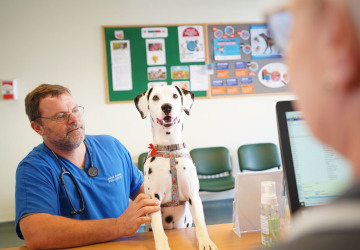
Cat vaccinations & parasite control – is there more to preventative care?
February 7, 2022
Did you know a preventative approach to your cat’s care is the best way to keep them in tip top condition for longer, and prevent them from catching a number of harmful diseases?
Here at Edgewood Vets in Purleigh, our Vets and Nurses have many years of experience dealing with serious cat health conditions that could have been prevented. In this article, our Head Vet Jürgen has put together their top five preventative healthcare ‘must-haves’ for cats.
To help cat and kitten owners further, our team have also created a handy checklist of everything your pet will need for a happy and healthy life on top of the preventative care list below.
Download our Cat Essentials Checklist
Five important preventative care needs for cats
1. Cat vaccinations
It is important to keep up with the recommended cat vaccination schedule advised by your Vet to give your pet optimum protection against infectious diseases. These preventable diseases can have devastating consequences and include:
- Feline panleukopenia virus (FPV, feline infectious enteritis; feline parvovirus)
- Feline herpesvirus (FHV-1, cat flu)
- Feline calicivirus (FCV, cat flu)
- Feline leukaemia virus (FeLV)
Many cat owners ask our Purleigh Vets, “do indoor cats needs vaccinating every year?” It is wise to remember that sometimes indoor cats can get out and neighbouring cats can get in, so there is always a risk for un-vaccinated cats. Also, FPV can be transferred via contaminated water, feed bowls, or on shoes and clothing.
Not sure if your cat’s vaccinations are up to date? Give us a call on 01621 828381 and our helpful reception team will check for you.
2. Cat flea & worm control
Fleas multiply at an alarming rate and will affect your cat, your human family, and your home. Cat fleas cause itching and irritation, leading to excessive scratching, sores, hair loss, and scabbing. An infestation can also cause anaemia and fleas can carry tapeworms and other diseases. Unprotected cats are at risk of picking up roundworms too. Therefore, an ongoing programme of vet-recommended cat flea and worm treatments is always the best option. Call 01621 828381 to see if your cat is due a treatment.
3. Cat neutering
The obvious reason to neuter any cat is to stop unwanted pregnancies – especially as female kittens can get pregnant at just 4 months of age. However, there are many more benefits of cat neutering including:
- reduced risk of mammary and prostate cancer
- prevention of testicular cancer and pyometra (uterine infection)
- prevention of stressful phantom pregnancies and seasons
- can stop some undesirable behaviours and make pets easier to live with
Talk to us about cat neutering
4. Health & dental checks
It is a good idea to get your cat’s dental and general health checked every 6 – 12 months so our Vets can begin treatment for any issues that could be brewing right away. Dental disease can be especially problematic for cats as most tend to hide pain and dislike having their teeth cleaned. Ensuring our Vets can get a good look at your cat’s teeth regularly means any concerns can be dealt with to improve your cat’s quality of life.
Cat microchipping
Finally, this might not seem like a preventative measure, however, it is something our experienced Vets always discuss with cat owners when talking about preventative healthcare. Microchipping your cat will greatly improve your chances of being reunited with them should they get taken to a vet practice, or an animal shelter, after going missing or being in an accident.
We hope the above advice is helpful. When it comes to your cat’s overall health and happiness, do you know what all their essential needs are? We have got you covered with our handy cat checklist – download it now.






